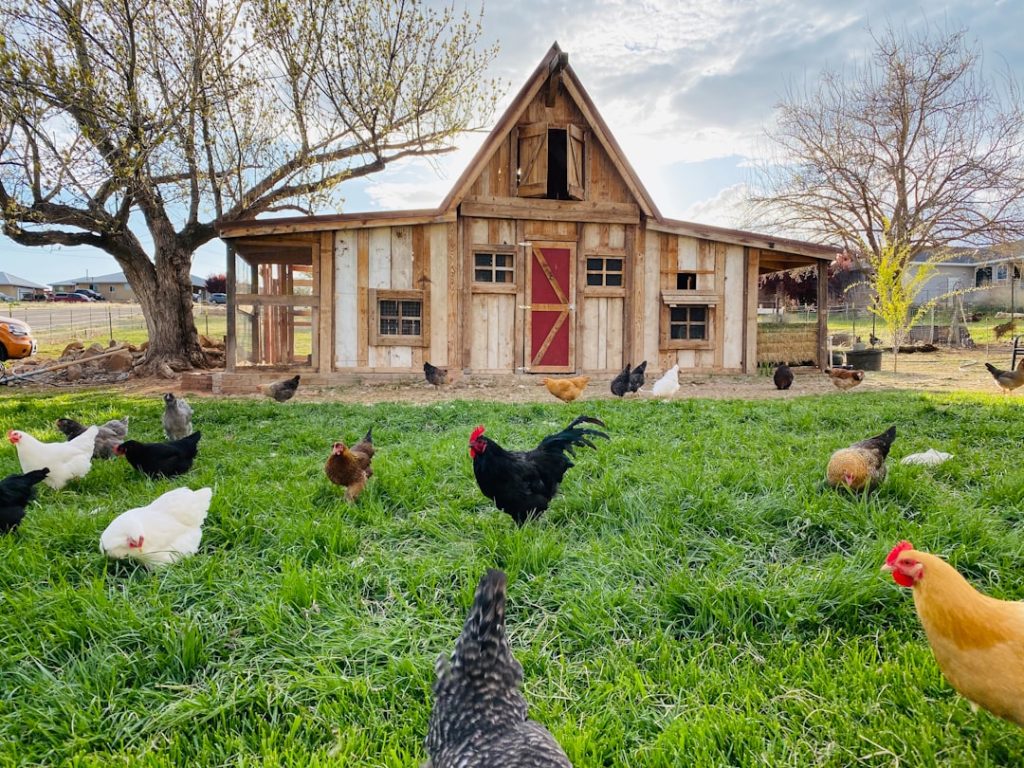Keeping chickens in a coop has become increasingly popular among both rural and urban dwellers. Chicken coops provide a safe and controlled environment for chickens to live in, while also allowing their owners to have fresh eggs and enjoy the benefits of raising their own poultry. However, there is ongoing debate about whether keeping chickens in a coop is cruel or not. In this post, we will discuss the advantages and disadvantages of keeping chickens in a coop, as well as the factors that determine whether it is cruel or not.
Key Takeaways
- Chicken coops provide a safe and secure environment for chickens to live in.
- Keeping chickens in a coop can help protect them from predators and disease.
- Overcrowding and lack of proper ventilation can lead to health problems for chickens in a coop.
- Providing adequate space, ventilation, and cleanliness is crucial for the well-being of chickens in a coop.
- The quality of feed and water provided to chickens in a coop can have a significant impact on their health and happiness.
What is a Chicken Coop?
A chicken coop is a structure specifically designed to house chickens. It provides shelter, protection from predators, and a controlled environment for the chickens to live in. There are different types of chicken coops available, ranging from small backyard coops to larger commercial coops. Backyard coops are typically smaller and designed for a few chickens, while commercial coops are larger and can house hundreds or even thousands of chickens.
Advantages of Keeping Chickens in a Coop
There are several advantages to keeping chickens in a coop. One of the main benefits is protection from predators. A well-built coop with secure fencing can keep out predators such as foxes, raccoons, and even neighborhood dogs. This ensures the safety of the chickens and reduces the risk of them being attacked or killed.
Another advantage is the ability to control the environment. In a coop, owners can regulate temperature, lighting, and ventilation to create optimal conditions for the chickens. This is especially important during extreme weather conditions such as hot summers or cold winters. By controlling the environment, owners can ensure that their chickens are comfortable and healthy.
Additionally, a chicken coop can improve the health and well-being of chickens. Coops provide a clean and protected space for chickens to live in, reducing the risk of diseases and infections. They also provide nesting boxes for hens to lay their eggs, which keeps the eggs clean and makes them easier to collect. Overall, a well-maintained coop can contribute to the overall health and productivity of the chickens.
Disadvantages of Keeping Chickens in a Coop
While there are advantages to keeping chickens in a coop, there are also some disadvantages. One of the main downsides is limited space. Chickens naturally like to roam and explore, and being confined to a coop can restrict their movement. This can lead to boredom and frustration, which may result in behavioral issues such as feather pecking or aggression.
Another disadvantage is the lack of freedom to roam. Chickens are social animals that enjoy foraging and exploring their surroundings. In a coop, they are confined to a limited area and may not have access to fresh grass or insects to eat. This can affect their overall well-being and may lead to a less varied diet.
However, these disadvantages can be mitigated with proper care and attention. Owners can provide enrichment activities such as perches, dust baths, and toys to keep the chickens entertained. They can also allow the chickens to free-range in a secure area outside of the coop for a certain amount of time each day. By providing these opportunities for exercise and exploration, owners can help alleviate some of the disadvantages of keeping chickens in a coop.
Factors that Determine Whether Keeping Chickens in a Coop is Cruel or Not
Whether keeping chickens in a coop is cruel or not depends on several factors. One of the main factors is the size of the coop. It is important to provide enough space for the chickens to move around comfortably. The recommended minimum space per chicken is 4 square feet in the coop and 10 square feet in the outdoor run. However, this can vary depending on the breed of chicken and their individual needs.
Another factor is the amount of time chickens spend in the coop. While it is necessary for chickens to have a safe and secure place to sleep and lay eggs, they also need time outside of the coop to exercise and explore. Allowing chickens to free-range in a secure area outside of the coop for a certain amount of time each day can help meet their natural behavioral needs.
The overall condition of the coop is also an important factor. It should be clean, well-maintained, and provide adequate ventilation and lighting. A dirty or poorly ventilated coop can lead to health issues such as respiratory infections or mites. Providing a clean and comfortable environment is essential for the well-being of the chickens.
The Importance of Providing Adequate Space in a Chicken Coop

Providing adequate space in a chicken coop is crucial for the well-being of the chickens. Chickens naturally like to move around and exercise, so it is important to give them enough space to do so. The recommended minimum space per chicken is 4 square feet in the coop and 10 square feet in the outdoor run.
However, it is important to note that these are minimum recommendations and providing more space is always better. More space allows chickens to move more freely, reduces the risk of aggression or feather pecking, and promotes overall health and well-being. If possible, it is recommended to provide even more space than the minimum requirements.
The amount of space needed can also vary depending on the breed of chicken. Some breeds are more active and require more space, while others are more docile and can tolerate smaller spaces. It is important to research the specific needs of the breed you are keeping and provide adequate space accordingly.
The Role of Proper Ventilation and Lighting in a Chicken Coop
Proper ventilation and lighting are essential for a healthy chicken coop. Good ventilation helps remove moisture, ammonia, and other gases from the coop, which can cause respiratory issues if not properly managed. It also helps regulate temperature and prevent the buildup of harmful bacteria or mold.
In terms of lighting, chickens require a certain amount of light to maintain their natural circadian rhythm and egg production. Natural light is ideal, but if that is not possible, artificial lighting can be used to supplement the natural light. The recommended amount of light for chickens is 14-16 hours per day.
It is important to ensure that the coop has adequate ventilation and lighting to promote the health and well-being of the chickens. Regularly cleaning and maintaining the coop can help prevent issues such as poor ventilation or inadequate lighting.
The Significance of Cleanliness and Hygiene in a Chicken Coop
Maintaining cleanliness and hygiene in a chicken coop is crucial for the health and well-being of the chickens. A dirty coop can lead to the buildup of harmful bacteria, parasites, and diseases. It can also attract pests such as flies or rodents, which can pose a threat to the chickens.
Regular cleaning of the coop is necessary to remove droppings, soiled bedding, and any other debris. This helps prevent the buildup of harmful bacteria and keeps the coop smelling fresh. It is also important to regularly change bedding material to maintain cleanliness.
In addition to regular cleaning, it is important to practice good biosecurity measures. This includes disinfecting equipment, preventing contact with wild birds or other animals, and quarantining new chickens before introducing them to the existing flock. These measures help prevent the spread of diseases and ensure a healthy environment for the chickens.
The Impact of the Quality of Feed and Water on Chickens in a Coop
Providing high-quality feed and water is essential for the health and productivity of chickens in a coop. Chickens require a balanced diet that includes protein, carbohydrates, fats, vitamins, and minerals. The feed should be formulated specifically for chickens and meet their nutritional needs.
In addition to providing high-quality feed, it is important to ensure that chickens have access to clean and fresh water at all times. Water is essential for digestion, temperature regulation, and overall health. It should be changed regularly to prevent contamination and kept in clean containers.
The quality of feed and water can greatly impact the health and productivity of chickens. Poor-quality feed can lead to nutrient deficiencies or imbalances, which can affect egg production, growth, and overall health. Similarly, contaminated or dirty water can lead to dehydration or the spread of diseases.
Is It Cruel to Keep Chickens in a Coop?
In conclusion, keeping chickens in a coop can be done humanely and responsibly with proper care and attention. While there are advantages and disadvantages to keeping chickens in a coop, it is important to consider the factors discussed in this post when deciding whether it is cruel or not.
Providing adequate space, proper ventilation and lighting, cleanliness and hygiene, and high-quality feed and water are all essential for the well-being of chickens in a coop. By meeting these requirements, owners can ensure that their chickens are comfortable, healthy, and able to exhibit natural behaviors.
Ultimately, the decision to keep chickens in a coop should be based on the individual circumstances and resources available. It is important to consider the needs of the chickens and provide them with a safe and suitable environment. With proper care and attention, keeping chickens in a coop can be a rewarding experience for both the chickens and their owners.
If you’re interested in learning more about chicken coops and their impact on the well-being of chickens, you might find this article on “The Chicken Coop Country Diner” from Poultry Wizard quite intriguing. It explores the concept of providing chickens with a coop that resembles a cozy diner, offering them a safe and comfortable space to roost and lay eggs. This unique approach to chicken coop design aims to enhance the overall welfare of the chickens. To delve deeper into the topic, you can check out the article here.
FAQs
What is a chicken coop?
A chicken coop is a structure designed to house and protect chickens. It typically includes a sheltered area for roosting and nesting, as well as an outdoor area for exercise and foraging.
Is it cruel to keep chickens in a coop?
It depends on the conditions of the coop. If the coop is clean, spacious, and provides adequate food, water, and ventilation, then it is not cruel to keep chickens in a coop. However, if the coop is dirty, cramped, and lacks proper care, then it can be considered cruel.
What are the benefits of keeping chickens in a coop?
Keeping chickens in a coop can protect them from predators, provide them with a safe and comfortable living environment, and allow for easier management of their food and water supply. It can also prevent them from damaging gardens or other areas of the property.
What are the drawbacks of keeping chickens in a coop?
Keeping chickens in a coop can limit their ability to forage and exercise, which can lead to health problems. It can also be more difficult to maintain a clean and healthy environment in a coop, especially if it is overcrowded or poorly designed.
What are some ways to ensure that chickens are not mistreated in a coop?
To ensure that chickens are not mistreated in a coop, it is important to provide them with adequate space, food, water, and ventilation. The coop should be cleaned regularly and any sick or injured chickens should be separated and treated promptly. It is also important to handle chickens gently and avoid overcrowding them.
Meet Walter, the feathered-friend fanatic of Florida! Nestled in the sunshine state, Walter struts through life with his feathered companions, clucking his way to happiness. With a coop that’s fancier than a five-star hotel, he’s the Don Juan of the chicken world. When he’s not teaching his hens to do the cha-cha, you’ll find him in a heated debate with his prized rooster, Sir Clucks-a-Lot. Walter’s poultry passion is no yolk; he’s the sunny-side-up guy you never knew you needed in your flock of friends!







